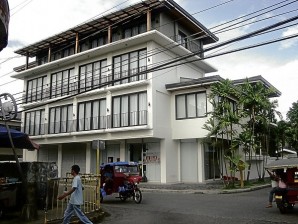With key projects, Tacloban moves toward economic sufficiency

THE BUS terminal in Tacloban City will soon become a major commercial hub in the city with the opening of Robinsons Mall and SM Hypermart this year. PHOTO BY Joey A. Gabieta
The capital city of Tacloban in Leyte is moving toward economic sufficiency by developing infrastructure and services.
With increasing influx of tourists and steady investor confidence, the regional center of trade and commerce in Eastern Visayas has been experiencing a bustling economy.
Based on government data, tourist arrivals in 2012 reached 64,678 or an increase of 279 percent in eight years. The 2010 census showed a population of 221,174 and a growth rate of 2.16 percent.
Business map
Tacloban has a total of 8,831 business establishments, mainly disaggregated as general merchandise (48.88 percent), contractor and services (19.09 percent), manufacturer (8.36 percent) and eatery (6.71 percent), according to a 2012 accomplishment report.
Article continues after this advertisementOther businesses are in real estate, financial institution, boarding houses, entertainment, hotel and lodging houses, and publication.
Article continues after this advertisementThese contributed to opportunities to create jobs, increase the purchasing power of residents, raise productivity of goods and services, and boost government revenue.
To support the growing financial needs of banks, microfinance companies and lending institutions, the Bangko Sentral ng Pilipinas (BSP) set up a regional branch in Barangay San Jose.
Over 25 subdivisions are found in the city. Having seen the real estate growth, Camella Homes put a subdivision in nearby Palo town in 2009.
Addressing the people’s healthcare needs are four private hospitals equipped with state-of-the-art facilities. The three government hospitals are undergoing improvement.

ANOTHER commercial building opens in Tacloban City, an indication of an economic boom being enjoyed by Eastern Visayas’ regional capital. PHOTO BY Joey A. Gabieta
The presence of local and national government offices, higher education institutions and print and broadcast media has brought more opportunities to small and medium enterprise investors.
More projects
For 2013, Taclobanons can expect a brighter economy, especially with several commercial and government projects in the pipeline.
SM Hypermart will rise on a 2,000-square-meter property near Tacloban New Bus Terminal. It will be the company’s 36th branch in a chain owned and operated by the Sy family. It will provide a combination of a supermarket, department store, discount store and specialty store in a single location.
Another branch of Robinsons Mall will also be constructed near the bus terminal.
As an offshoot, more transport routes will be opened to new franchise holders, as well as new markets to farm producers within the city and nearby municipalities.
The city’s projected income through taxes is expected to increase with the establishment of SM Hypermart.
Various infrastructure projects are expected to boost the economy.
The Water Supply Expansion Project being undertaken by Leyte Metropolitan Water District will be completed this year. It will supply 19,000 cubic meters per day to residents and business establishments.
Mactan Rock, a private water supplier, is completing the project to address the water needs in selected areas. Its primary market is Robinsons Place.
The upgrading of water services will solve the problem of water supply and attract more investors.
By this year, a 23-hectare IT park will be developed in Barangay Pawing at the border with Palo town. It is poised to become an information and communications technology hub in Leyte for business process outsourcing companies, department stores, health and wellness establishments, coffee shops, hotel, food chains and recreation areas.
The businesses will generate investment opportunities and jobs.
Airport upgrade
The national government has also allocated millions of pesos for the upgrading and renovation of Daniel Z. Romualdez Airport, the lone airport in the city and the seventh busiest in the country.
The facility services 18 daily flights to major routes to Manila, Cebu, Davao, Bacolod and Legaspi. It is planned to become an international airport soon, creating new routes to boost arrivals of both domestic and foreign tourists.
As a result, demand for hotels and accommodation, transportation, food and beverage, souvenir shops and allied services will go up.
With these promising developments, Tacloban is ready to face the challenges in the years to come.
Socrates O. Ballais, Sarah G. Cajipo, Ramil M. Perez, Ma. Daisy L. Lagdamen and Carmelita C. Doming are members of the economics faculty of the College of Arts and Sciences of Eastern Visayas State University in Tacloban City.